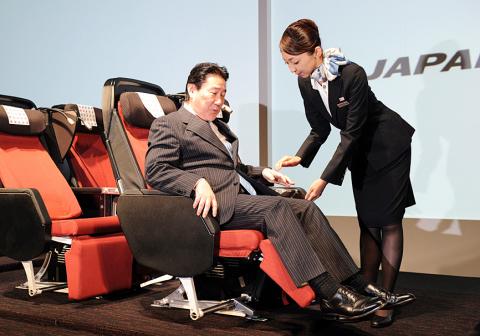Japan Airlines Ltd (JAL), delisted from the Tokyo stock exchange after its bankruptcy in 2010, was set to return to Japan’s biggest bourse this week after a massive overhaul and US$8.5 billion share sale.
The carrier is to begin trading on Wednesday following its initial public offering (IPO) — the world’s second-biggest IPO this year after Facebook — marked a stunning turnaround for one of Japan’s worst corporate catastrophes.
“The re-listing is a very important milestone for us and something that we had craved, but it is also just part of our bigger goal of steady profitability,” JAL president Yoshiharu Ueki told reporters last week.

Photo: AFP
“Without being carried away by the euphoria ... we will make further efforts so that we respond to our new investors’ expectations,” he added.
JAL crashed into bankruptcy in January 2010, owing ¥2.3 trillion (US$29 billion) in one of Japan’s biggest-ever corporate failures, but continued flying while it went through a rehabilitation process under court protection.
The overhauled carrier, recently touted as the world’s most profitable airline, received a huge government bailout and other concessions, drawing howls of protest from rivals, including All Nippon Airways.
Led by charismatic businessman Kazuo Inamori, who was brought in by the government to help turn the firm around, JAL also withdrew from unprofitable routes and sold or merged non-core businesses.
Last month, JAL pointed to its improved financial health, saying net profit in the April-to-June quarter more than doubled to ¥26.9 billion.
The airline has embarked on an ambitious expansion, saying earlier this year it ordered 10 new fuel-efficient Boeing 787 Dreamliner aircraft as it looks to build on its recovery.
The announcement, part of a five-year plan, is in addition to an existing order for 35 of the mid-sized planes capable of flying long-range routes.
In a regulatory filing on Monday last week, JAL said it expected to sell 175 million new shares at ¥3,790 each — the top end of a previously announced range — which would translate to proceeds of ¥663 billion.
That is nearly double the amount of public money spent to keep it afloat during the massive restructuring, with the proceeds expected to be used to pay back the government bailout.
The offering was the year’s second-biggest globally behind Facebook, after the social networking giant’s US$16 billion IPO in May, although Facebook shares have dived since their much-hyped May 18 debut.

The US dollar was trading at NT$29.7 at 10am today on the Taipei Foreign Exchange, as the New Taiwan dollar gained NT$1.364 from the previous close last week. The NT dollar continued to rise today, after surging 3.07 percent on Friday. After opening at NT$30.91, the NT dollar gained more than NT$1 in just 15 minutes, briefly passing the NT$30 mark. Before the US Department of the Treasury's semi-annual currency report came out, expectations that the NT dollar would keep rising were already building. The NT dollar on Friday closed at NT$31.064, up by NT$0.953 — a 3.07 percent single-day gain. Today,

‘SHORT TERM’: The local currency would likely remain strong in the near term, driven by anticipated US trade pressure, capital inflows and expectations of a US Fed rate cut The US dollar is expected to fall below NT$30 in the near term, as traders anticipate increased pressure from Washington for Taiwan to allow the New Taiwan dollar to appreciate, Cathay United Bank (國泰世華銀行) chief economist Lin Chi-chao (林啟超) said. Following a sharp drop in the greenback against the NT dollar on Friday, Lin told the Central News Agency that the local currency is likely to remain strong in the short term, driven in part by market psychology surrounding anticipated US policy pressure. On Friday, the US dollar fell NT$0.953, or 3.07 percent, closing at NT$31.064 — its lowest level since Jan.

Hong Kong authorities ramped up sales of the local dollar as the greenback’s slide threatened the foreign-exchange peg. The Hong Kong Monetary Authority (HKMA) sold a record HK$60.5 billion (US$7.8 billion) of the city’s currency, according to an alert sent on its Bloomberg page yesterday in Asia, after it tested the upper end of its trading band. That added to the HK$56.1 billion of sales versus the greenback since Friday. The rapid intervention signals efforts from the city’s authorities to limit the local currency’s moves within its HK$7.75 to HK$7.85 per US dollar trading band. Heavy sales of the local dollar by

The Financial Supervisory Commission (FSC) yesterday met with some of the nation’s largest insurance companies as a skyrocketing New Taiwan dollar piles pressure on their hundreds of billions of dollars in US bond investments. The commission has asked some life insurance firms, among the biggest Asian holders of US debt, to discuss how the rapidly strengthening NT dollar has impacted their operations, people familiar with the matter said. The meeting took place as the NT dollar jumped as much as 5 percent yesterday, its biggest intraday gain in more than three decades. The local currency surged as exporters rushed to